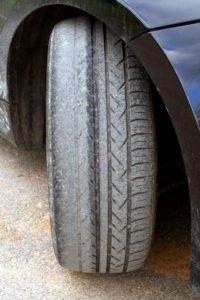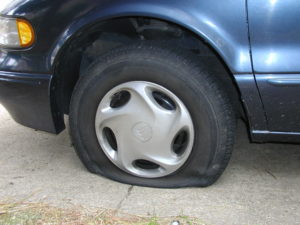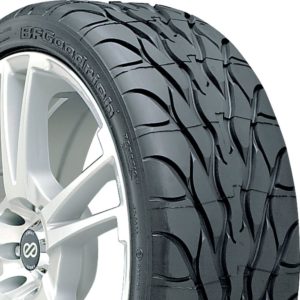 The Automobile Club of Southern California has recently stated that as long as your vehicle has tires that are in good working condition, you would be able to have good fuel economy and extend the life of your vehicle as well. This is in accordance and with regards to the National Tire Safety Week which started just last April 23rd and would be continuing to the end of this week. The tire shown in this picture is definitely not in good working condition. Your Tires Condition counts.
The Automobile Club of Southern California has recently stated that as long as your vehicle has tires that are in good working condition, you would be able to have good fuel economy and extend the life of your vehicle as well. This is in accordance and with regards to the National Tire Safety Week which started just last April 23rd and would be continuing to the end of this week. The tire shown in this picture is definitely not in good working condition. Your Tires Condition counts.
The front end needs to be aligned and maybe some tie rods replaced. This tire has severe wear and tear on the left hand side and the car probably pulls badly to the right as you are driving. Never mind about fuel economy, this driver needs to be concerned about the safety of his vehicle. He should be concerned about being able to stop quickly with out causing an accident.
Tires in Good Working Condition
So exactly what is “good working condition”? We have listed a few items that would be necessary for your tires to be considered in good working condition. They are as follows:
- Proper tire pressure, not over and not under inflated
- All four tires balanced properly
- No cuts, tears or obvious damage to the tire
- No premature wear and tear on one side of the tire or another
- At least 1/8 of an inch of tread on the tires and this is considered low
- Proper tires on the car, fitted for speed rating, size and width
- Tire age is not more than 6 years
The National Tire Safety Week was launched so as to assist drivers in understanding the basic tire care. Aside from this, the fact remains that there is still that need for proper tire maintenance.
From research completed, the statistics have shown that around 85 percent of drivers do not actually check their vehicle’s tire pressure properly or even at all.
Engineer Steve Mazor who is the Auto Club’s principal automotive engineer states, “Not knowing the condition of your vehicle’s tires is equal to pouring money down the drain. Proper tire inflation is necessary to for safe driving and to reduce gas costs.”
Your Tires Condition counts – Under Inflated Tires
He continue-s, “Under inflated tires can cut fuel economy by up to two percent per pound of pressure below the recommended level. They can cause your tires to run hot and they can prematurely wear out as well.
After every fill up, motorists should walk around their vehicles and check tires for uneven or excessive tread wear and proper inflation. Drivers can refer to their vehicle’s doorjamb or glove box for original specifications or the manufacturer of the replacement tire for tire pressure.”
As per statistics that the National Highway Traffic Safety Administration (NHTSA) has, nearly one out of every three vehicles on the roads and highways has a significant under inflated tire. Aside from this fact is that there are some 600 fatalities and around 33,000 injuries that happen every year. These are results of low tire pressure related crashes.
Make it a Habit
It is an easy habit to get into. Before you start the car every morning, take a quick walk around the car. Check the tire pressure by observation, and if a tire looks low, check it with a tire pressure gauge. Once a week use a gauge to check the actual pressure and top up if needed.
Never over inflate since the tire pressure will increase as you use the car at high speeds. After you have done this a few times, you will quickly be able to assess whether a tire is low or not.
Benefits of Tire Maintenance
Although we have focused on tire condition and checking the inflation of tires, there are two primary reasons to check your tires. One is to gain better gas mileage. Your car will get the best gas mileage if your tires are properly inflated and balanced. In addition tires that are well maintained have less tendency to have a blow out. If this happens at high speeds, you might lose control of the car causing far more serious consequences.
Feel free to leave comments about tire maintenance etc, to help our readers avoid accidents and gain better gas mileage.
 Reading Worn out Tire Treads can be critical to your safety while driving your car. A worn-out tire can blow at any time, especially at high speeds. The tire will heat up causing the pressure to increase and pop goes the tire. A flat tire at high speeds can be quite dangerous and cause loss of control. If it leads to an accident, your life may be in danger. Take a look at all of your tires and take the appropriate action as needed before you have a catastrophic accident. Each check may cost some money but your tires will last longer and you just may avoid an accident.
Reading Worn out Tire Treads can be critical to your safety while driving your car. A worn-out tire can blow at any time, especially at high speeds. The tire will heat up causing the pressure to increase and pop goes the tire. A flat tire at high speeds can be quite dangerous and cause loss of control. If it leads to an accident, your life may be in danger. Take a look at all of your tires and take the appropriate action as needed before you have a catastrophic accident. Each check may cost some money but your tires will last longer and you just may avoid an accident.


 that you have when a tire is slightly below normal tire pressure. Many newer high end cars now have tire pressure monitoring systems as standard equipment. These are excellent warning systems when tires are low on air pressure, yet not obvious to the naked eye.
that you have when a tire is slightly below normal tire pressure. Many newer high end cars now have tire pressure monitoring systems as standard equipment. These are excellent warning systems when tires are low on air pressure, yet not obvious to the naked eye.